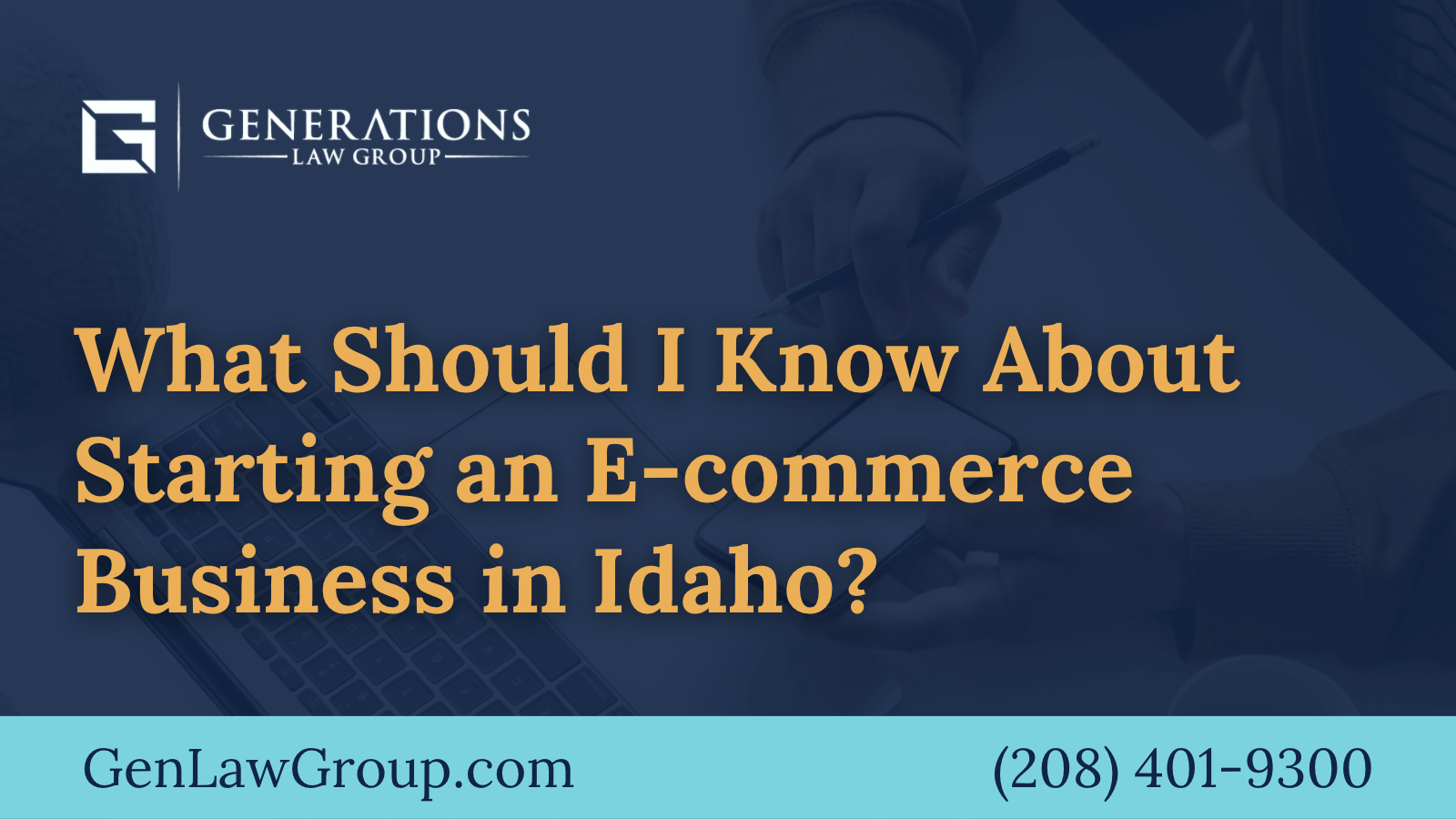If you plan to start an ecommerce business, it’s time to move from just planning to taking action.
The COVID-19 pandemic influenced an increase in online retail sales. Amid lockdowns, travel bans, and physical store closures, people were left with no other option but to turn to online stores.
This is not changing anytime soon.
Even before the pandemic, ecommerce stores were already experiencing annual growth, but with the recent astronomical increase, people have adapted, and ecommerce is now the new normal.
However, the growth of online business has also led to stricter ecommerce laws and more demanding legal processes. If you’re currently experiencing this with your online business or are just getting started and need guidance, Generations Law Group is here to help.
Working with Idaho ecommerce businesses is nothing new for the Generations Law team, and we’re happy to offer our legal knowledge to small, online business owners.
What Steps Do I Need to Consider When Starting an Ecommerce Business?
Just about anybody can start an ecommerce business, but correctly operating one can be tricky. It goes beyond just delivering quality customer service. You also need to pay attention to legal issues regarding privacy, taxes, digital marketing, and terms of service.
Starting an ecommerce business is completely different from starting a physical store.
Some initial steps you have to consider, whether you’re going to be solely based online or you are also going to have a physical store, include:
- Choosing a business model: Every business has to have a structure. Will yours be a sole proprietorship, partnership, limited liability company (LLC), or corporation? The type of structure will determine benefits and legal protection, as well as drawbacks.
- Getting tax identification numbers: Once the business has been successfully approved, you will need to get a federal Taxpayer Identification Number (TIN). This is essential for all business types.
- Opening a business bank account: You cannot or should not run an ecommerce business with your personal bank account; you need to have a dedicated bank account strictly for business transactions.
At Generations Law Group, business is our bread and butter. We’re happy to help you get started.
What are Some Specific Considerations for Idaho Ecommerce Stores?
An ecommerce store and a physical store have a lot in common, but despite similarities, there are a lot of differences in how they are legally recognized.
It is important to pay special attention to these differences according to Idaho law so you don’t face legal issues that could ruin your business.
Here are some of the differences you should be aware of:
- Business owners without a physical location have to collect sales tax when their total sales are greater than $100,000 in the current year or previous year
- If you operate your business through online marketplaces, like Amazon, you may need to file a “zero return,” which means you don’t have sales tax to remit to Idaho because the marketplace takes care of the sales tax
- Ecommerce stores are exposed to a lot of customer data; they have access to monitor and track customer activity and collect large amounts of user information. They also have access to users’ sensitive information like credit card numbers and addresses.
It’s important to discuss these details with an experienced Idaho business formation attorney before getting started.
How Do You Protect Your Ecommerce Business?
Protecting your business is one of the most important parts of running it. You want to be sure that you are not liable for anything that may happen as well as safeguarding your personal information.
Here are some important steps in keeping your business safe:
- Creating terms of service. You should create a term of service, a contract between you and the website users. This is not legally required, but it is important as it gives users better control of their website and lets customers know what to and what not to expect. It will also protect you in case of a legal dispute. Standard ecommerce terms of service agreement should include: payments, refunds, language addressing account terms, prohibited uses and actions, returns, liability limitation, and dispute resolution.
- Safeguarding intellectual property. You need to secure your intellectual property and protect it from unauthorized use. Your unique domain name, business name, logo, and product names can be registered as trademarks. You should also use copyrights to protect your content, such as graphics, written material, and video. Finally, you should closely guard trade secrets and use nondisclosure agreements.
- Prevent becoming spam. Nobody likes it when well intentioned advertising ends up in the spam folder. Under the Controlling the Assault of Non-Solicited Pornography And Marketing (CAN-SPAM) Act, before you can send commercial messages, there are certain requirements you need to meet. First, the email must have an unsubscribe link; failure to comply with CAN-SPAM will put you in trouble.
These systems require continuous planning and monitoring.
Ignoring or overlooking a step could land you in serious trouble.
Contact Generations Law Group today
Are you already starting up your own ecommerce business? Then you’ll need proper guidance to ensure that you legally comply with the relevant regulations and protect your rights. Boise-based Generations Law Group is here to help. We have decades of experience contract drafting and providing all types of legal advice to Idaho business owners.
We understand the importance of drafting agreements and other legal documents correctly to be enforceable and legally binding. Contact us for your consultation today.



